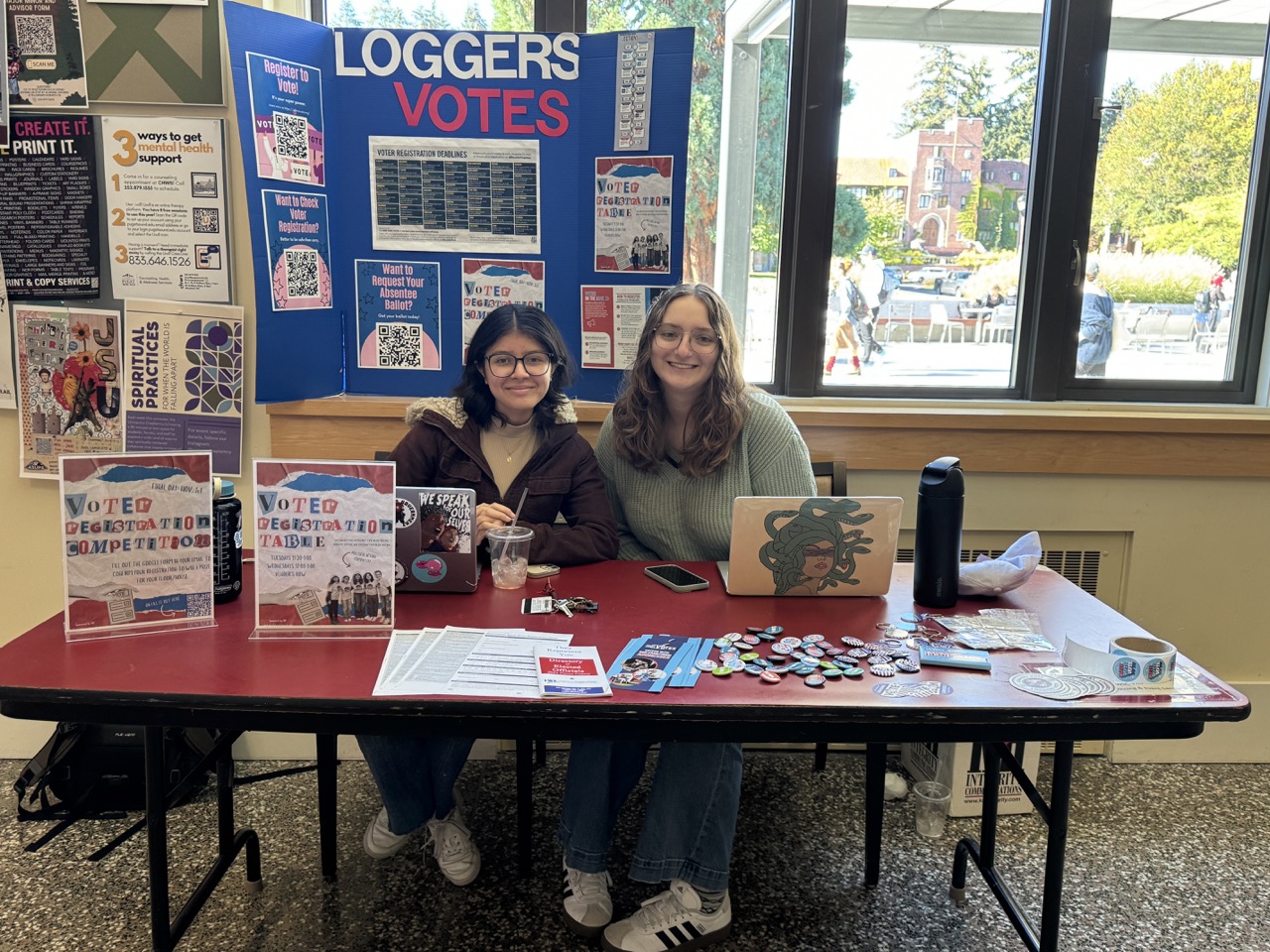
By KennedyRose Stiver and Kyi Carino
Aiming to provide non-partisan support for increased civic engagement on campus, the Voter Engagement Team — a student-run initiative associated with Student Involvement and Programs (SIP) — has been hosting various events to incentivise students to turn out to vote. Passionate to help register as many students as possible, the Voter Engagement Team also educates the campus community with voting information and instructions. Prior to their events on campus, they researched and issued personalized emails to every student regarding their own state’s voting laws.
“Not every family is super politically engaged, and maybe you don’t agree with your parents. Having a nonpartisan team of students that is willing to help you no matter how you vote, just to get that access is really important,” Civic Engagement Coordinator, Abi Longbottom (‘26), said.
Through the week of Oct. 7 and 11, the Voter Engagement Team hosted Voter Education Week. Each day held a different theme, ranging from information surrounding absentee and mail-in ballots to the various ways students can register to vote and more. In addition, the organization is hosting a competition involving all residence halls and Greek houses.The organization will provide a catered movie night for the hall or house with the largest number of registered students. “We’re hoping that’s a big incentive to get people to actually put their screenshot of their confirmation of their registration,” Voter and Political Engagement Specialist, Valeria Gutierrez (‘27), said.
Despite the team’s progress thus far, there has been difficulty increasing student engagement when there is not a prominent presidential election, according to Civic Engagement Coordinator, Iliana Barnes Diaz (‘25), “It’s a lot more challenging when you don’t have a big, flashy election to motivate people,” Diaz said.
On Oct. 10, 2024, the Sociology and Anthropology Department hosted an open student discussion regarding the upcoming election. Students discussed issues ranging from polarization, immigration, and whether or not their vote actually matters.
Students see polarization increasing through the means of media algorithms. Not only has the algorithm caught up to us, it keeps up with us. People are subject only to the content they desire, diminishing chances for open-minded discussions regarding politics. Citizens may watch the presidential and vice-presidential debates, but they watch them with a winner already in mind — independent of how the debates transpire. It is not just social media, but also news media institutions that are believed to “cherry-pick information” suitable to their primary audiences.
In addition, a student brought up that the country’s increased polarization may be a result of “no external factors to unite the people.” Students mentioned that events such as 9/11, World War II, and the Cold War were all factors that led to a sense of unity amongst Americans. This generation simply does not have the external factors, as previous generations had, to unite against. There is “no fight left,” as one student put it.
In the 2024 presidential race, both candidates advocate stricter border enforcement. As categorized by Professor Jennifer Utrata of Sociology and Anthropology, one candidate advocates for a shut down of the border, and the other is only slightly more lenient on the matter. Students claimed that the border issue has enlighted a new “internal class warfare” amongst immigrants. Immigrants will blame other immigrants for the negative stereotypes shared among them. This includes the false perception that immigrants increase crime rates.
After the 2024 Presidential Election, some students say that no matter who wins, we are already “living in the reality of the right.” The Supreme Court will not change. In addition, through laws passed in states such as Florida’s “Don’t Say Gay” bill and Louisiana and Oklahpoma’s requirements to have the Ten Commandments in public school classrooms, “the right is creeping into our lives,” a student claimed.
In contrast, students are optimistic of the possible social changes the country may experience if Kamala Harris wins the election. Harris would be the first woman of color to lead the United States, and students believe her victory may change the stigma surrounding immigration, women and beyond.
No matter how the presidential election goes, some feel that because of the polarization of the country, society must place more emphasis on local elections. The Voter Engagement Team supports this. Longbottom urges students to consider what they are advocating for in local elections. “Where do you want to vote locally? What kind of vocal local elections do you want to vote on? Where do you feel your vote is going to matter the most in the sense of where you want your voice to be heard?” Longbottom said. It can be argued that local elections are more impactful for individuals because they have a “direct payoff.” A voice is loudest on the local level.
